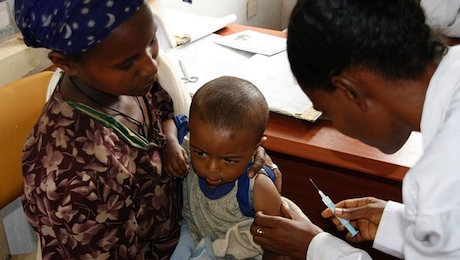A report put out the Vermont Department of Health in coordination with out-of-state universities indicates that efforts by states to reverse “vaccine hesitancy” among parents with newborns have largely proven ineffective.
“In focusing on the core survey and behavioral outcomes, we are unable to identify the mechanisms by which messages could change vaccine attitudes and behavior — another important area for future research,” the report released on Sunday states.
The report is a compilation of efforts from researchers at Dartmouth College, the Vermont Department of Health, Stanford University, and IE University in Spain. Participants included Vermont residents.
“The first study, which we refer to as the general parent study, was conducted among a sample of Vermont residents who are parents or guardians of one or more children age ten or younger who completed survey measures of their vaccine beliefs and attitudes and self-reported intent to vaccinate their children,” it states.

SOME PARENTS SAYING NO: Some parents have decided against vaccinating their children, and Vermont is investigating how to convince them to take the jab anyway.
The results were not encouraging for those attempting to change skeptical parents’ minds.
“Our results showed no effect of either message on parents’ attitudes and beliefs about vaccines, their intention to vaccinate their children, or their subsequent compliance with the immunization schedule,” the report states.
The messaging focused on these parents included “emphasizing the social norm around vaccination that reminded parents of the consensus in favor of vaccination to prevent disease in Vermont.”
The report does not offer any examination of parents’ specific concerns, and dismisses the autism-vaccine connection as “a myth.” It also suggests that news outlets that present contrary data on vaccines are “misinformation.”
“Nyhan et al. find that corrective information debunking the vaccine-autism myth reduced parents’ self-reported intention to vaccinate relative to a control condition, but Zhang et al. find that exposure to fact-checking labels improves attitudes toward vaccines relative to people who see only misinformation,” it states.
Vermont is currently touted by health care officials as the most vaccinated state in the nation, according to a report by USNews.com.
“Of all the states, Vermont appeared best prepared for the omicron battle: It is the nation’s most vaccinated state against COVID-19, with nearly 80% of residents fully vaccinated,” the news report states.
However, that status didn’t mean Vermont faired the best against the virus.
“The state in mid-January hit record highs for residents hospitalized with COVID-19; elective surgeries in some Vermont hospitals are on hold; and schools and daycare centers are in a tailspin from the numbers of staff and teacher absences and students quarantined at home,” U.S. News reported.
Various studies have indicated that vaccine reactions do occur. Recently released documents from vaccine manufacturer Pfizer indicate that there were 1,291 side effects observed during trials. The FDA requested to withhold that information from the public for the next 75 years. But in January, a federal judge ordered the FDA to begin releasing thousands of pages requested by the nonprofit group Public Health and Medical Professionals for Transparency based on an August 2021 Freedom of Information Act request.
Researchers have found that heart inflammation is a particularly concerning side-effect associated with Covid-19 vaccinations.
The full report can be read online here.
Michael Bielawski is a reporter for True North. Send him news tips at bielawski82@yahoo.com and follow him on Twitter @TrueNorthMikeB.



“we are unable to identify the mechanisms by which messages could change vaccine attitudes and behavior” – O.K., how about enumerating the young athletes that have dropped dead on the field and see if it changes vaccine attitudes and behavior. Or the fully vaccinated public figures, politicians, who have contracted covid anyway.
Science isn’t about a message last time I took science class, it was about objective, repeatable facts and results.
The message is about propaganda, usually trying to sell you something that doesn’t work.
Since the vaccines clearly don’t work and have many adverse side affects, it’s a wonder anyone is even considering a fourth jab.
Ther should be trials against humanity, jailing of many health officials for the unnecessary deaths of millions of people, all for money and power.
The hesitancy is probably more due to the truth finally seeping out of
the 1200 side effects from the vax, the daily report of sports figures collapsing after
getting the jab and finding it don’t last and don’t keep you from getting the crud.
It’s also driving the crud to mutate and being vaxed makes you a spreader of the
crud.. but by all means keeping lying about how safe and effective it is…
Those who push the Vaxx and Boost agenda should be reminded that they will not be allowed to use the “I was just following orders” excuse. That was tried in the past and found not to work.
Hear! hear!
Buy stock in rope factories.